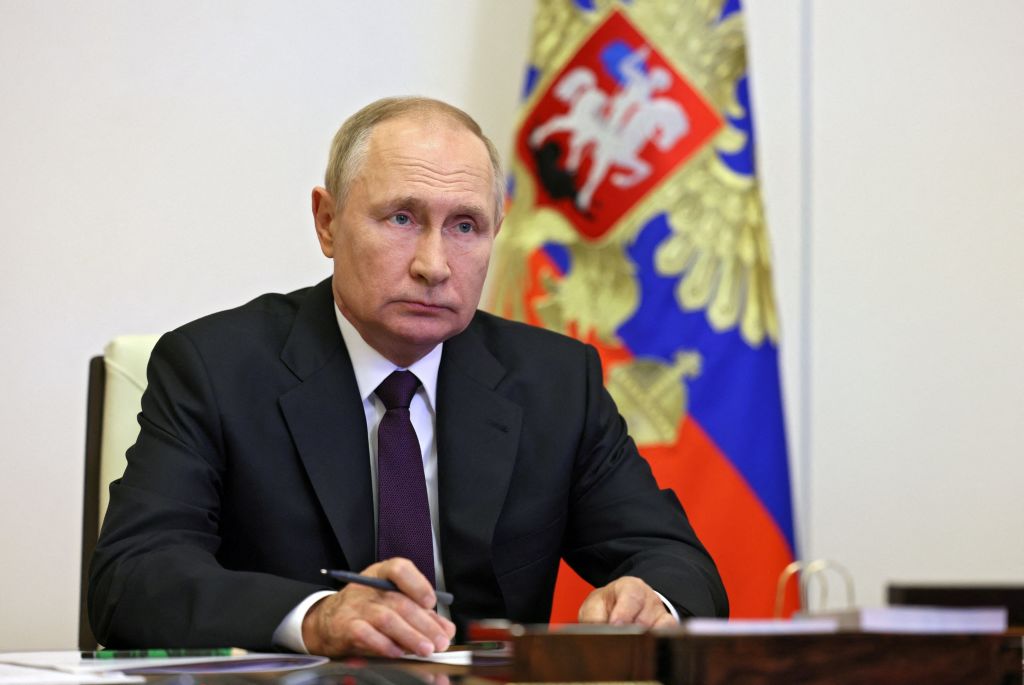Russia spent at least $300 million meddling in foreign politics, elections since 2014, U.S. says


A free daily email with the biggest news stories of the day – and the best features from TheWeek.com
You are now subscribed
Your newsletter sign-up was successful
Russia has secretly given at least $300 million to foreign political parties, candidates, and officials in more than 24 countries since 2014 in order to shift elections and shape political events in Moscow's favor, the Biden administration said Tuesday. U.S. intelligence agencies detected Russia trying to buy influence in Albania, Montenegro, Madagascar, and maybe Ecuador, a U.S. official told reporters, and Russia's ambassador to one Asian country gave millions of dollars in cash to a presidential candidate in that country.
U.S. intelligence "assesses that these are minimum figures and that Russia likely has transferred additional funds covertly in cases that have gone undetected," a senior Biden administration official said. "By shining this light on Russian covert political financing and Russian attempts to undermine democratic processes, we're putting these foreign parties and candidates on notice that if they accept Russian money secretly we can and we will expose it."
"We think this is just the tip of the iceberg," the official said. Most countries were not identified by name, and the intelligence review did not examine Russian activities inside the U.S., though "there's no question that we have this vulnerability as well," the official said.
The Week
Escape your echo chamber. Get the facts behind the news, plus analysis from multiple perspectives.

Sign up for The Week's Free Newsletters
From our morning news briefing to a weekly Good News Newsletter, get the best of The Week delivered directly to your inbox.
From our morning news briefing to a weekly Good News Newsletter, get the best of The Week delivered directly to your inbox.
The U.S. declassified the intelligence on Russian political interference to disseminate it among other countries — U.S. embassies in more than 100 countries were sent the information Monday — and share it with the public, as it has with other intelligence on the Kremlin's intentions and actions since the lead-up to Russia's invasion of Ukraine in February. The information sent to the embassies identified Russian oligarchs — among them "Putin's chef" Yevgeniy Prigozhin and Aleksandr Babakov, who allegedly financed a far-right party in France — involved in political "financing schemes."
This interference in foreign elections and politics is "an assault on sovereignty," State Department spokesman Ned Price said. "In order to fight this, in many ways we have to put a spotlight on it."
"The U.S. has meddled in foreign elections more than 80 times worldwide between 1946-2000, not including coups or attempts at regime change," BBC News notes, citing a database kept by Carnegie Mellon University researcher Dov Levin.
A free daily email with the biggest news stories of the day – and the best features from TheWeek.com
Peter has worked as a news and culture writer and editor at The Week since the site's launch in 2008. He covers politics, world affairs, religion and cultural currents. His journalism career began as a copy editor at a financial newswire and has included editorial positions at The New York Times Magazine, Facts on File, and Oregon State University.
-
 What to know before filing your own taxes for the first time
What to know before filing your own taxes for the first timethe explainer Tackle this financial milestone with confidence
-
 The biggest box office flops of the 21st century
The biggest box office flops of the 21st centuryin depth Unnecessary remakes and turgid, expensive CGI-fests highlight this list of these most notorious box-office losers
-
 The 10 most infamous abductions in modern history
The 10 most infamous abductions in modern historyin depth The taking of Savannah Guthrie’s mother, Nancy, is the latest in a long string of high-profile kidnappings
-
 Judge blocks Hegseth from punishing Kelly over video
Judge blocks Hegseth from punishing Kelly over videoSpeed Read Defense Secretary Pete Hegseth pushed for the senator to be demoted over a video in which he reminds military officials they should refuse illegal orders
-
 Trump’s EPA kills legal basis for federal climate policy
Trump’s EPA kills legal basis for federal climate policySpeed Read The government’s authority to regulate several planet-warming pollutants has been repealed
-
 House votes to end Trump’s Canada tariffs
House votes to end Trump’s Canada tariffsSpeed Read Six Republicans joined with Democrats to repeal the president’s tariffs
-
 Bondi, Democrats clash over Epstein in hearing
Bondi, Democrats clash over Epstein in hearingSpeed Read Attorney General Pam Bondi ignored survivors of convicted sex offender Jeffrey Epstein and demanded that Democrats apologize to Trump
-
 El Paso airspace closure tied to FAA-Pentagon standoff
El Paso airspace closure tied to FAA-Pentagon standoffSpeed Read The closure in the Texas border city stemmed from disagreements between the Federal Aviation Administration and Pentagon officials over drone-related tests
-
 ‘The mark’s significance is psychological, if that’
‘The mark’s significance is psychological, if that’Instant Opinion Opinion, comment and editorials of the day
-
 Judge blocks Trump suit for Michigan voter rolls
Judge blocks Trump suit for Michigan voter rollsSpeed Read A Trump-appointed federal judge rejected the administration’s demand for voters’ personal data
-
 US to send 200 troops to Nigeria to train army
US to send 200 troops to Nigeria to train armySpeed Read Trump has accused the West African government of failing to protect Christians from terrorist attacks
